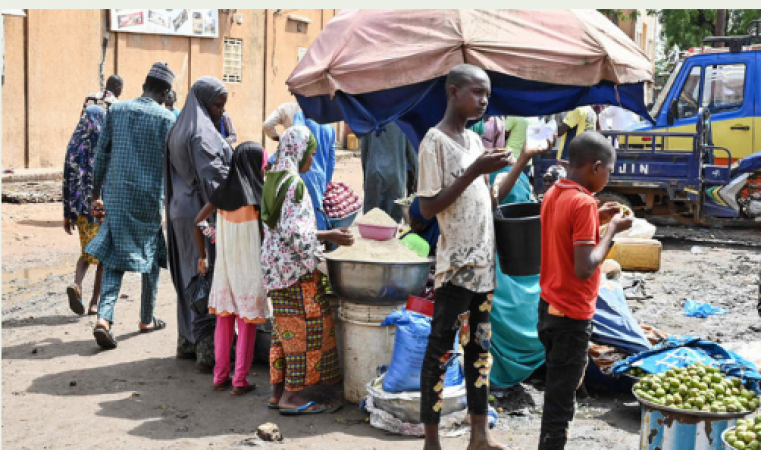
Niamey: Although the nearly two-week-old coup in Niger resulted in international condemnation and restrictions on domestic freedoms, many residents of the capital say the change is a breath of fresh air.
On Sunday, about 30,000 people gathered in a stadium in Niamey to show their support for the soldiers who overthrew Mohamed Bazoum, the elected president of Niger, on July 26.
The event, according to critics from abroad and locally, was stage-managed in order to support the coup leaders in their conflict with the West African bloc ECOWAS, which is threatening to use force to restore Bazoum.
Also Read: Celebrate International Cat Day with your cute furry Friend with all Rudiments
However, there were many people in the stadium and on the streets of Niamey who appeared genuinely relieved to see Bazoum's Nigerien Party for Democracy and Socialism (PNDS) leave power after 12 years in power.
The mechanic, Ousseini Tinni, exclaimed, "It's liberation!" Alhassane Adamou, a private sector office administrator, declared that "we feel free" in light of the situation that this nation has been in for decades. Since Niamey has long been regarded as an opposition stronghold, domestic opponents of the coup and its effects on rights have kept a low profile.
Although there have not been any widespread arrests, the coup leaders have also declared the suspension of the constitution, forbade public gatherings, and detained a number of Bazoum's ministers.
Many of the people who spoke with AFP in this regard claimed that the PNDS's version of democracy had been a fraud. Samaila Abdourahim, a trader, declared, "I support the soldiers completely. "The old regime talked about democracy, but these were just empty words. We were living under a dictatorship, not a democracy.
Also Read: Berlin-Warsaw Spat: Poland's Deputy Foreign Minister Accuses Germany of Undermining Economy
The election of Bazoum in 2021, which marked the first peaceful transfer of power in Niger since it gained independence from France in 1960, has won him praise abroad.
But in Niamey, where many people harbour resentment or disappointment, there is frequently a different perspective on Bazoum.
They cite the one-year prison sentence given to opposition leader Hama Amadou for child trafficking, which disqualified him from running for office.
Following Bazoum's victory, riots broke out in the capital, resulting in 468 arrests and two fatalities.
The Economist Intelligence Unit included Niger in its 2022 Democracy Index as one of the nations with "authoritarian regimes."
"We held back from speaking our minds. You were taken into custody as soon as you voiced your opinion, said Tinni.
Others spoke out about how the PNDS had allegedly fostered cronyism, corruption, and insecurity.
The onlookers gathered around Adamou nodded in agreement as he said, "This is what caused the public to support the putsch."
One of the targets of the hostility is France, whose backing of Bazoum, a crucial ally in the French anti-jihadist strategy in the Sahel, is seen as evidence of complicity.
Ken Opalo, an associate professor at Georgetown University in Washington, compared the Niger coup to military coups that occurred in the neighbouring countries of Burkina Faso and Mali in 2020 and 2022, respectively.
He stated in a blog post that foreign allies placed a high priority on "controlling the migration flows, gaining access to natural resources, combating jihadists in the Sahel so they don't have to do so in Western cities, and maintaining overall geopolitical influence in the region."
Democracy and economic growth have typically taken a back seat to these more important goals.
The International Crisis Group (ICG) think tank stated in a report on Monday that "President Bazoum launched a sincere effort to reform institutions and governance... but his capacity for changing the actual practises of the state and its representatives was restricted by the need to balance the political forces that brought him to power."
Whether General Abdourahamane Tiani, the newest strongman in Niger and a rumoured confidant of the late president Mahamadou Issoufou, will bring about change is the question.
Also Read: 10 Soldiers Killed as Daesh Strikes Syrian Army Checkpoint
More than half of the Nigeriens surveyed in an opinion survey conducted by the research firm Afrobarometer and released in March 2022 expressed dissatisfaction with the way democracy was working in their country.
However, 84 percent opposed dictatorship, and 61 percent said they preferred democracy to other forms of government. We will rebel against the military if they start acting like politicians, said Abdourahim.
"If we tolerate them today, it's because having them there serves our interests. Because now the decisions will be made by the people, not us.